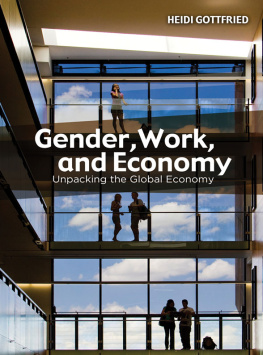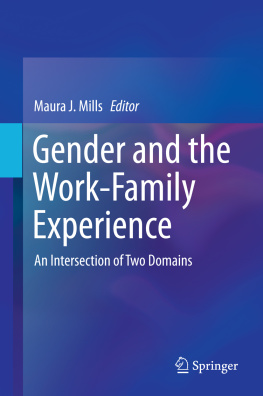1
Introduction
Debra Howcroft and Helen Richardson
This edited book has emerged from a CRESC (Centre for Research on Socio-Cultural Change) workshop held in Manchester in February 2008, which provided a forum to debate Gender, Service Work and the Cultural Economy. The aim of this collection, based largely on contributions from the workshop, is to explore the social and cultural issues within the economic changes that have given rise to service work, which represents the largest occupational sector (ILO 2008). This sector is often polarized between higher-paid ICT-enabled knowledge work and lower-paid catering, cleaning and care work. In order to gain a broad appreciation of working lives, we adopt an inclusive approach with chapters covering a variety of types of service work. Written by specialists in their respective fields, this book draws together authors from interdisciplinary areas that are carrying out significant research into the totality of womens working lives and studying varying combinations of gender and service work within an international context. Authors originate from a range of disciplinary backgrounds including sociology, anthropology, critical management, industrial relations, economics, geography, gender studies, and science and technology studies. Accordingly, the analysis being presented is accompanied by diverse illustrations, such as IT workers in Mumbai, lone parents undergoing CISCO network engineer training in London, financial and retail service workers in Europe, Indian nurses working for the UK NHS, a historical study of female telegraphers, and call centre staff employed to service the emerging domestic market in India.
Gender and service work in the global economy
As womens participation in labour markets increases (ILO 2007) along with the expansion of service sector work, expectations emerge that suggest increased opportunities and gender equality beckon. Yet, as more women participate in paid employment, equality of opportunity remains elusive (Elson 1999; Perrons 2004), with women often concentrated in industries where profit margins are protected by shrinking labour costs, extending working hours or reducing the number of formal workers (Heintz 2006). The feminization of employment is a term used to describe the increasing numbers of women entering the jobs market, and highlights the irony of suggesting that women are integrated as equals into the workforce at a time when women have been pushed into more precarious forms of work. It is used to characterize the activities associated with womens work: ideologically constructed and with fluid definitions according to the role of the family and the specific requirements of the local labour market at any given time.
The influx of women workers has been particularly pronounced in the service sector (Horgan 2001; UNCTAD 2003) and these trends are most marked in countries where womens participation in agriculture is low (for example in East and South East Asia and Latin America). Women moving into ICT-enabled service work, such as financial and IT services, have displaced men in areas once considered to be well-paid and highly skilled. These changes in employment indicators should be interpreted within the framework of labour markets generally, since they are gendered institutions operating at the intersections of the productive and reproductive economies and often constructed on assumptions that women are secondary earners (Elson 1999). Discrimination also features, resulting in women being concentrated in occupations of low or unequal pay or with gender pay gaps, in work of high risk and insecurity and with few opportunities for advancement.
Shifting global employment trends have gone hand-in-hand with liberalization, featuring an easing of restrictions on internal and external trade and deregulation of labour protection, which has enabled unprecedented growth in contract labour and opportunities for subcontracting (Jhabvala and Sinha 2007). This has facilitated a reduction of the core size of the firm with an expansion of the periphery to new outsourced sites in other (often less developed) countries (Benera 2001) as firms search for more flexible ways to accumulate capital. In the quest for new sources of profit, labour is sought in cheaper localities, aided by neoliberal policies, which aim to support the deregulation of trade and financial transactions.
Contemporary debates concerning globalization of the economy tend to place emphasis on new clusters of scientific and technological innovations particularly ICTs and the convergence of ways of life around the globe (Wajcman 2002; Perrons 2004). Within the service sector, networking technologies have enabled market expansion, removed geographical constrictions and facilitated wider organizational diffusion as large amounts of data are shared and transmitted at minimal cost (Ellis and Taylor 2006). The competitiveness of the offshoring industry rests on its connectivity (Abugattas 2007), as robust international communication networks mean it is now possible to produce services in one place while they are simultaneously being consumed in another. The application of ICTs to many service activities have allowed for the fragmentation of production based on standardized processes (Mann 2007) as international divisions of labour and regional inequalities become increasingly apparent (Castree et al. 2004; Huws 2007).
Ostensibly, the increasing adoption of ICTs may appear to break down spatial barriers as investors and companies globally relocate to lower labour cost regions or shift focus from the formal to the informal economy. Yet the specificities of location become increasingly significant as global capital selects location based on almost minimal differences between places (Herod et al. 2007). To attract Foreign Direct Investment (FDI), developing countries need to be able to offer key location-specific assets, which include political and economic stability, possibilities for low-cost production or special market access, a well-functioning telecommunications infrastructure and a burgeoning software sector for back-office process and software services (Paus 2007). These spatial considerations must be borne in mind as capitalists negotiate two contradictory spatial tendencies the need for sufficient geographical mobility to seek out investment opportunities in new locations, and the need for sufficient geographical fixity so that accumulation can occur (Harvey 1982). Hence we see that, although India remains the dominant supplier of offshore services among developing countries, a number of Indian firms are either relocating aspects of their own offshoring activity to other countries in order to maintain competitiveness or tapping into offshoring opportunities in other developing countries so as to pre-empt the emergence of competitors (Abugattas 2007). Place and location take on different characteristics as capitalists seek new spatial forms. The Caribbean, for example, served as the initial location for information processing work (Freeman 2000; Freeman this volume), but this has now been surpassed by regions of India, where much of the UK and US ICT work is outsourced (Taylor and Bain 2005).
Given that, in the majority of countries in the world, women are still at an economic disadvantage compared with men (ILO 2004), some argue optimistically that ICT-enabled service work has the potential to provide distinct possibilities for reducing gender inequities and providing economic autonomy for women workers. These opportunities are seen to arise in a number of ways (Stanworth 2000). Firstly, the global expansion of capitalism has been dependent on a huge influx of women into the workforce, women who have traditionally been dependent on husbands and male relatives, and so paid employment offers a new degree of financial independence. Secondly, ICTs release women from time and location constraints traditionally associated with the workplace, thus allowing women to better combine paid work with caring responsibilities (the rhetoric of worklife balance). Thirdly, proponents of the information or network age (Bell 1973; Castells 1996) predict the rise of flatter organizations, based on teamwork rather than competition, allowing more women to be represented in management positions.







